Developing a Philosophy of Education: Theories and Practice
VerifiedAdded on 2023/04/23
|6
|1185
|260
Essay
AI Summary
This essay outlines the author's personal philosophy of education, beginning with an introduction to the concept of education as a lifelong process influenced by Sri Aurobindo. It explores the author's perception of teaching, emphasizing the role of a teacher as a facilitator and guide, drawing on the theories of John Dewey and highlighting the importance of motivating students. The essay then delves into the author's perception of learning, viewing it as an inseparable component of the teaching-learning process, and discussing the cyclical nature of learning. Furthermore, the essay details the author's teaching goals, which focus on the holistic development of students, including physical, mental, spiritual, and moral growth, with an emphasis on skill-based training and providing multiple learning opportunities. Finally, the essay provides an example of how the author's philosophy was successfully implemented in the classroom, demonstrating the positive outcomes of student-centered teaching.
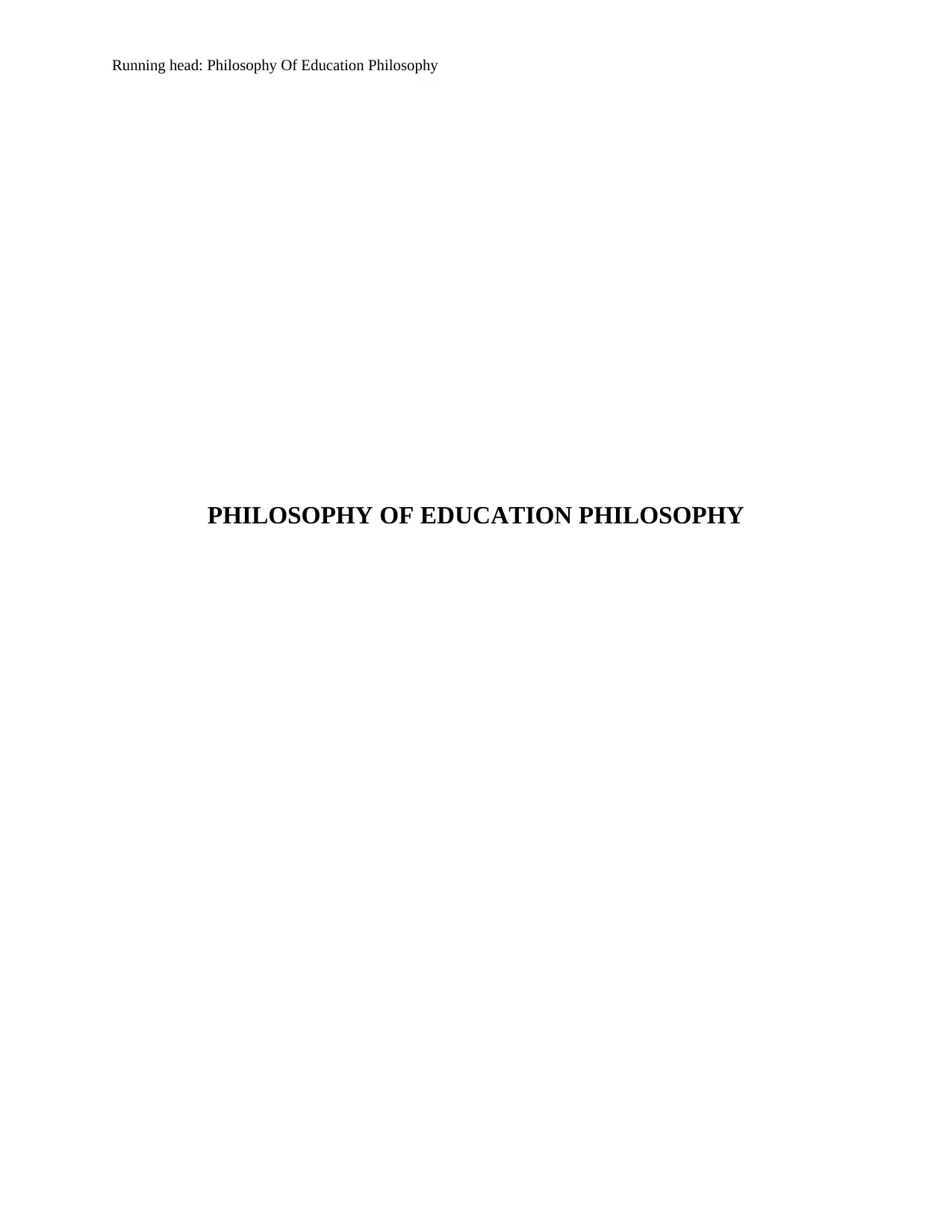
Running head: Philosophy Of Education Philosophy
PHILOSOPHY OF EDUCATION PHILOSOPHY
PHILOSOPHY OF EDUCATION PHILOSOPHY
Paraphrase This Document
Need a fresh take? Get an instant paraphrase of this document with our AI Paraphraser
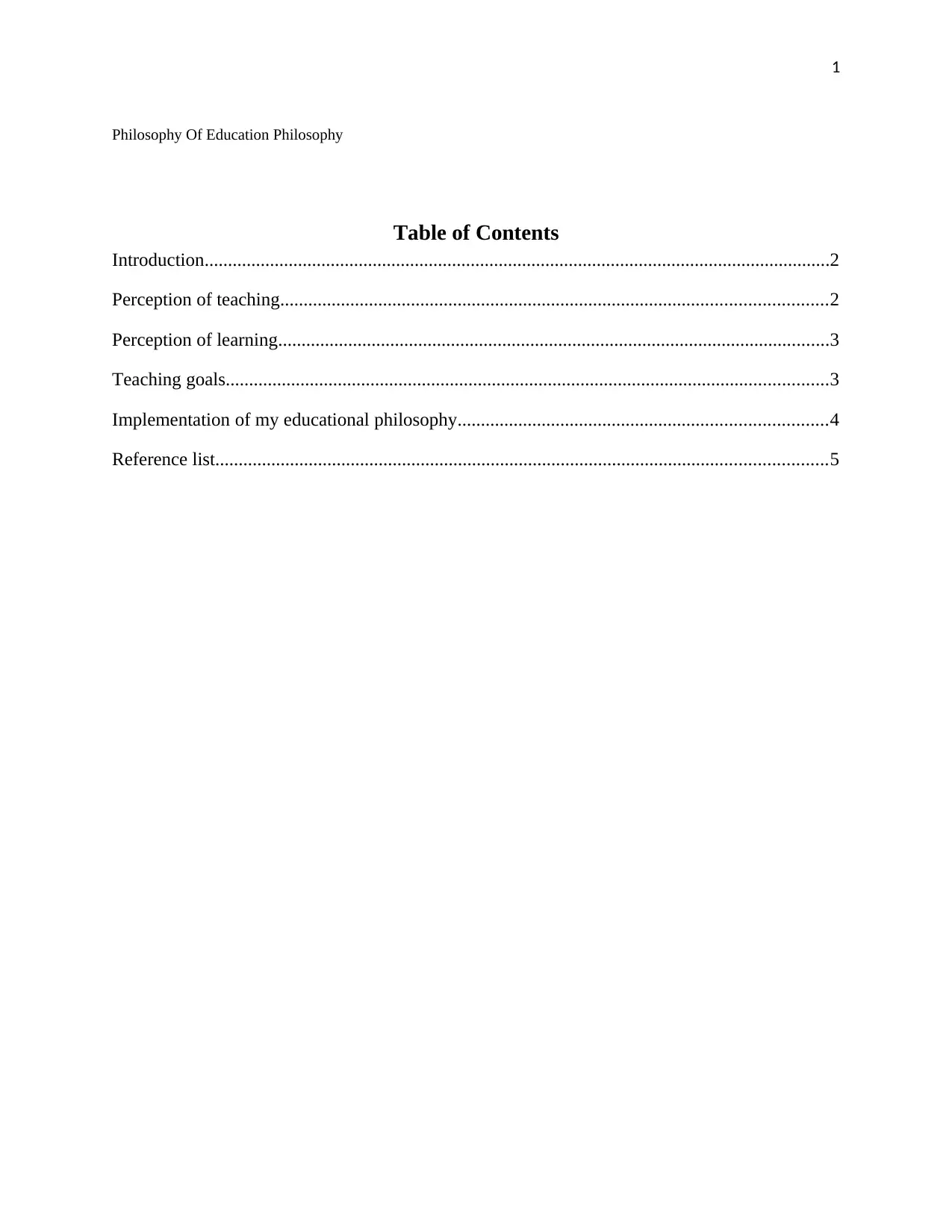
1
Philosophy Of Education Philosophy
Table of Contents
Introduction......................................................................................................................................2
Perception of teaching.....................................................................................................................2
Perception of learning......................................................................................................................3
Teaching goals.................................................................................................................................3
Implementation of my educational philosophy...............................................................................4
Reference list...................................................................................................................................5
Philosophy Of Education Philosophy
Table of Contents
Introduction......................................................................................................................................2
Perception of teaching.....................................................................................................................2
Perception of learning......................................................................................................................3
Teaching goals.................................................................................................................................3
Implementation of my educational philosophy...............................................................................4
Reference list...................................................................................................................................5
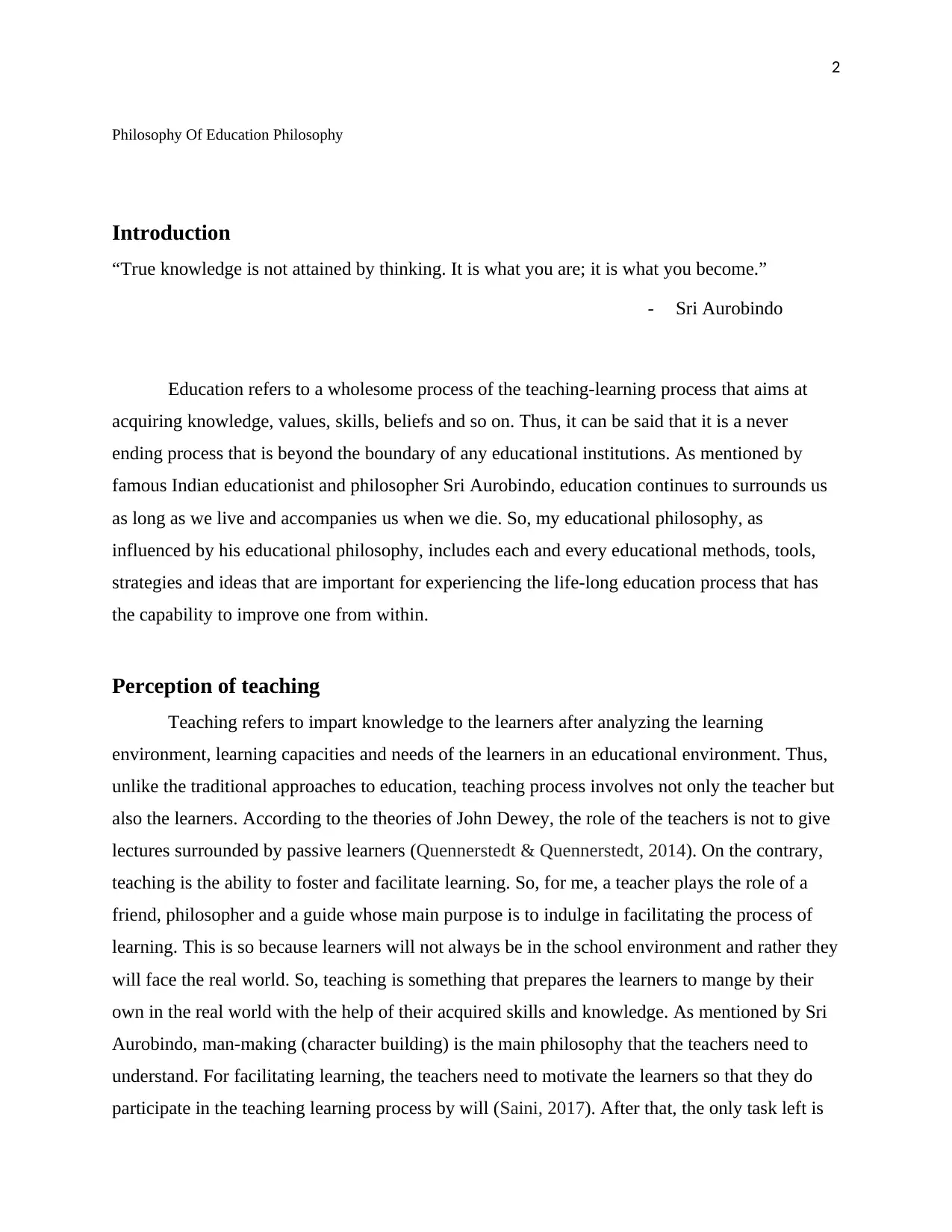
2
Philosophy Of Education Philosophy
Introduction
“True knowledge is not attained by thinking. It is what you are; it is what you become.”
- Sri Aurobindo
Education refers to a wholesome process of the teaching-learning process that aims at
acquiring knowledge, values, skills, beliefs and so on. Thus, it can be said that it is a never
ending process that is beyond the boundary of any educational institutions. As mentioned by
famous Indian educationist and philosopher Sri Aurobindo, education continues to surrounds us
as long as we live and accompanies us when we die. So, my educational philosophy, as
influenced by his educational philosophy, includes each and every educational methods, tools,
strategies and ideas that are important for experiencing the life-long education process that has
the capability to improve one from within.
Perception of teaching
Teaching refers to impart knowledge to the learners after analyzing the learning
environment, learning capacities and needs of the learners in an educational environment. Thus,
unlike the traditional approaches to education, teaching process involves not only the teacher but
also the learners. According to the theories of John Dewey, the role of the teachers is not to give
lectures surrounded by passive learners (Quennerstedt & Quennerstedt, 2014). On the contrary,
teaching is the ability to foster and facilitate learning. So, for me, a teacher plays the role of a
friend, philosopher and a guide whose main purpose is to indulge in facilitating the process of
learning. This is so because learners will not always be in the school environment and rather they
will face the real world. So, teaching is something that prepares the learners to mange by their
own in the real world with the help of their acquired skills and knowledge. As mentioned by Sri
Aurobindo, man-making (character building) is the main philosophy that the teachers need to
understand. For facilitating learning, the teachers need to motivate the learners so that they do
participate in the teaching learning process by will (Saini, 2017). After that, the only task left is
Philosophy Of Education Philosophy
Introduction
“True knowledge is not attained by thinking. It is what you are; it is what you become.”
- Sri Aurobindo
Education refers to a wholesome process of the teaching-learning process that aims at
acquiring knowledge, values, skills, beliefs and so on. Thus, it can be said that it is a never
ending process that is beyond the boundary of any educational institutions. As mentioned by
famous Indian educationist and philosopher Sri Aurobindo, education continues to surrounds us
as long as we live and accompanies us when we die. So, my educational philosophy, as
influenced by his educational philosophy, includes each and every educational methods, tools,
strategies and ideas that are important for experiencing the life-long education process that has
the capability to improve one from within.
Perception of teaching
Teaching refers to impart knowledge to the learners after analyzing the learning
environment, learning capacities and needs of the learners in an educational environment. Thus,
unlike the traditional approaches to education, teaching process involves not only the teacher but
also the learners. According to the theories of John Dewey, the role of the teachers is not to give
lectures surrounded by passive learners (Quennerstedt & Quennerstedt, 2014). On the contrary,
teaching is the ability to foster and facilitate learning. So, for me, a teacher plays the role of a
friend, philosopher and a guide whose main purpose is to indulge in facilitating the process of
learning. This is so because learners will not always be in the school environment and rather they
will face the real world. So, teaching is something that prepares the learners to mange by their
own in the real world with the help of their acquired skills and knowledge. As mentioned by Sri
Aurobindo, man-making (character building) is the main philosophy that the teachers need to
understand. For facilitating learning, the teachers need to motivate the learners so that they do
participate in the teaching learning process by will (Saini, 2017). After that, the only task left is
⊘ This is a preview!⊘
Do you want full access?
Subscribe today to unlock all pages.

Trusted by 1+ million students worldwide
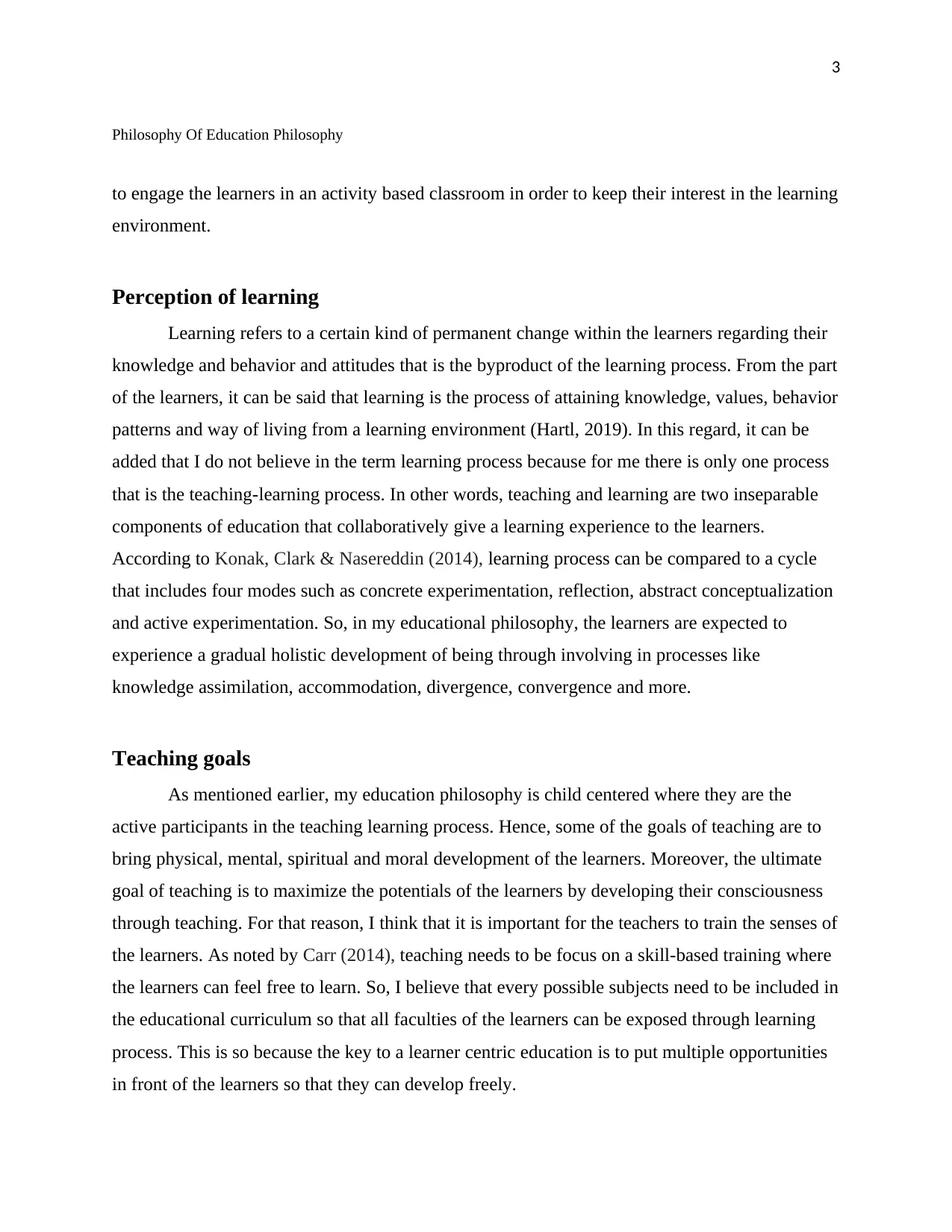
3
Philosophy Of Education Philosophy
to engage the learners in an activity based classroom in order to keep their interest in the learning
environment.
Perception of learning
Learning refers to a certain kind of permanent change within the learners regarding their
knowledge and behavior and attitudes that is the byproduct of the learning process. From the part
of the learners, it can be said that learning is the process of attaining knowledge, values, behavior
patterns and way of living from a learning environment (Hartl, 2019). In this regard, it can be
added that I do not believe in the term learning process because for me there is only one process
that is the teaching-learning process. In other words, teaching and learning are two inseparable
components of education that collaboratively give a learning experience to the learners.
According to Konak, Clark & Nasereddin (2014), learning process can be compared to a cycle
that includes four modes such as concrete experimentation, reflection, abstract conceptualization
and active experimentation. So, in my educational philosophy, the learners are expected to
experience a gradual holistic development of being through involving in processes like
knowledge assimilation, accommodation, divergence, convergence and more.
Teaching goals
As mentioned earlier, my education philosophy is child centered where they are the
active participants in the teaching learning process. Hence, some of the goals of teaching are to
bring physical, mental, spiritual and moral development of the learners. Moreover, the ultimate
goal of teaching is to maximize the potentials of the learners by developing their consciousness
through teaching. For that reason, I think that it is important for the teachers to train the senses of
the learners. As noted by Carr (2014), teaching needs to be focus on a skill-based training where
the learners can feel free to learn. So, I believe that every possible subjects need to be included in
the educational curriculum so that all faculties of the learners can be exposed through learning
process. This is so because the key to a learner centric education is to put multiple opportunities
in front of the learners so that they can develop freely.
Philosophy Of Education Philosophy
to engage the learners in an activity based classroom in order to keep their interest in the learning
environment.
Perception of learning
Learning refers to a certain kind of permanent change within the learners regarding their
knowledge and behavior and attitudes that is the byproduct of the learning process. From the part
of the learners, it can be said that learning is the process of attaining knowledge, values, behavior
patterns and way of living from a learning environment (Hartl, 2019). In this regard, it can be
added that I do not believe in the term learning process because for me there is only one process
that is the teaching-learning process. In other words, teaching and learning are two inseparable
components of education that collaboratively give a learning experience to the learners.
According to Konak, Clark & Nasereddin (2014), learning process can be compared to a cycle
that includes four modes such as concrete experimentation, reflection, abstract conceptualization
and active experimentation. So, in my educational philosophy, the learners are expected to
experience a gradual holistic development of being through involving in processes like
knowledge assimilation, accommodation, divergence, convergence and more.
Teaching goals
As mentioned earlier, my education philosophy is child centered where they are the
active participants in the teaching learning process. Hence, some of the goals of teaching are to
bring physical, mental, spiritual and moral development of the learners. Moreover, the ultimate
goal of teaching is to maximize the potentials of the learners by developing their consciousness
through teaching. For that reason, I think that it is important for the teachers to train the senses of
the learners. As noted by Carr (2014), teaching needs to be focus on a skill-based training where
the learners can feel free to learn. So, I believe that every possible subjects need to be included in
the educational curriculum so that all faculties of the learners can be exposed through learning
process. This is so because the key to a learner centric education is to put multiple opportunities
in front of the learners so that they can develop freely.
Paraphrase This Document
Need a fresh take? Get an instant paraphrase of this document with our AI Paraphraser
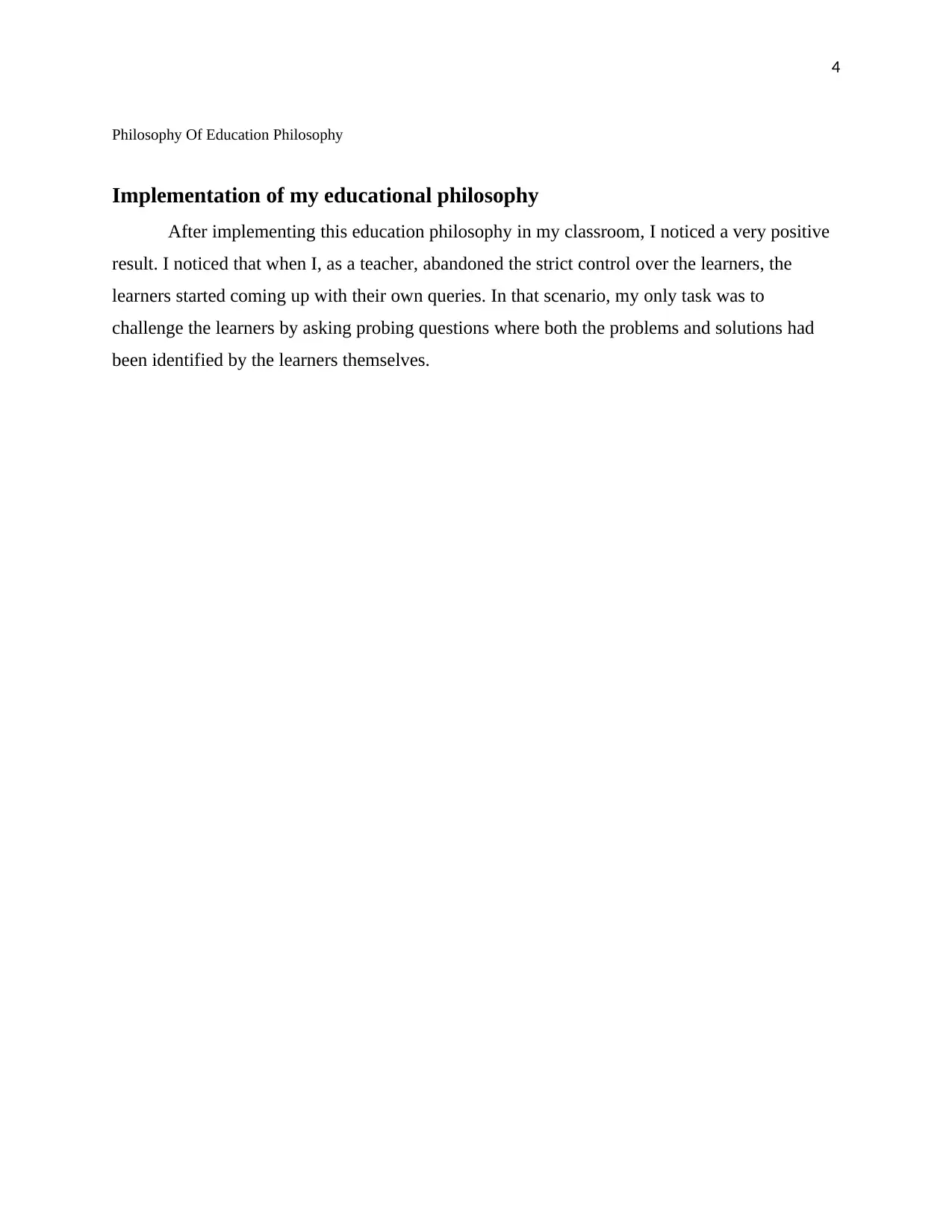
4
Philosophy Of Education Philosophy
Implementation of my educational philosophy
After implementing this education philosophy in my classroom, I noticed a very positive
result. I noticed that when I, as a teacher, abandoned the strict control over the learners, the
learners started coming up with their own queries. In that scenario, my only task was to
challenge the learners by asking probing questions where both the problems and solutions had
been identified by the learners themselves.
Philosophy Of Education Philosophy
Implementation of my educational philosophy
After implementing this education philosophy in my classroom, I noticed a very positive
result. I noticed that when I, as a teacher, abandoned the strict control over the learners, the
learners started coming up with their own queries. In that scenario, my only task was to
challenge the learners by asking probing questions where both the problems and solutions had
been identified by the learners themselves.
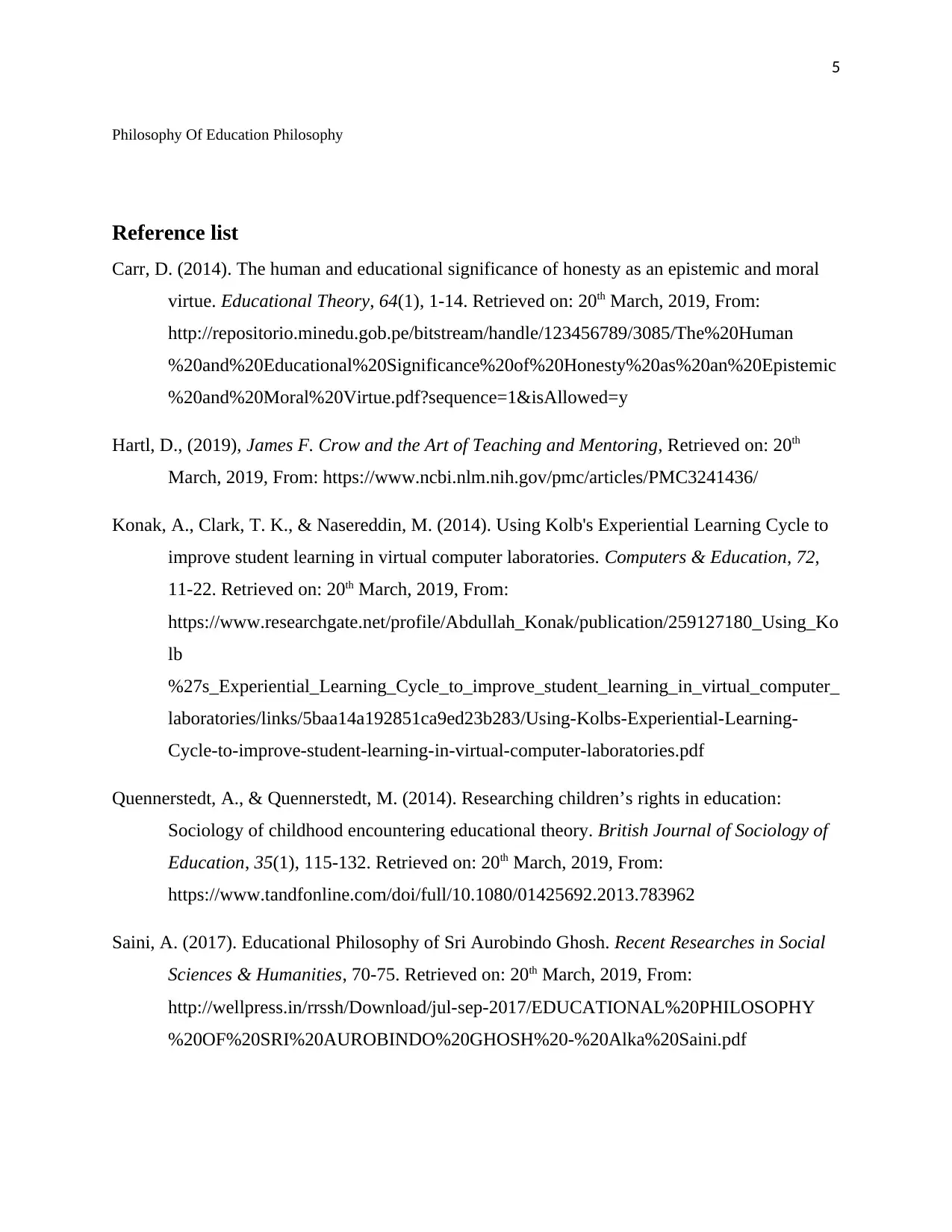
5
Philosophy Of Education Philosophy
Reference list
Carr, D. (2014). The human and educational significance of honesty as an epistemic and moral
virtue. Educational Theory, 64(1), 1-14. Retrieved on: 20th March, 2019, From:
http://repositorio.minedu.gob.pe/bitstream/handle/123456789/3085/The%20Human
%20and%20Educational%20Significance%20of%20Honesty%20as%20an%20Epistemic
%20and%20Moral%20Virtue.pdf?sequence=1&isAllowed=y
Hartl, D., (2019), James F. Crow and the Art of Teaching and Mentoring, Retrieved on: 20th
March, 2019, From: https://www.ncbi.nlm.nih.gov/pmc/articles/PMC3241436/
Konak, A., Clark, T. K., & Nasereddin, M. (2014). Using Kolb's Experiential Learning Cycle to
improve student learning in virtual computer laboratories. Computers & Education, 72,
11-22. Retrieved on: 20th March, 2019, From:
https://www.researchgate.net/profile/Abdullah_Konak/publication/259127180_Using_Ko
lb
%27s_Experiential_Learning_Cycle_to_improve_student_learning_in_virtual_computer_
laboratories/links/5baa14a192851ca9ed23b283/Using-Kolbs-Experiential-Learning-
Cycle-to-improve-student-learning-in-virtual-computer-laboratories.pdf
Quennerstedt, A., & Quennerstedt, M. (2014). Researching children’s rights in education:
Sociology of childhood encountering educational theory. British Journal of Sociology of
Education, 35(1), 115-132. Retrieved on: 20th March, 2019, From:
https://www.tandfonline.com/doi/full/10.1080/01425692.2013.783962
Saini, A. (2017). Educational Philosophy of Sri Aurobindo Ghosh. Recent Researches in Social
Sciences & Humanities, 70-75. Retrieved on: 20th March, 2019, From:
http://wellpress.in/rrssh/Download/jul-sep-2017/EDUCATIONAL%20PHILOSOPHY
%20OF%20SRI%20AUROBINDO%20GHOSH%20-%20Alka%20Saini.pdf
Philosophy Of Education Philosophy
Reference list
Carr, D. (2014). The human and educational significance of honesty as an epistemic and moral
virtue. Educational Theory, 64(1), 1-14. Retrieved on: 20th March, 2019, From:
http://repositorio.minedu.gob.pe/bitstream/handle/123456789/3085/The%20Human
%20and%20Educational%20Significance%20of%20Honesty%20as%20an%20Epistemic
%20and%20Moral%20Virtue.pdf?sequence=1&isAllowed=y
Hartl, D., (2019), James F. Crow and the Art of Teaching and Mentoring, Retrieved on: 20th
March, 2019, From: https://www.ncbi.nlm.nih.gov/pmc/articles/PMC3241436/
Konak, A., Clark, T. K., & Nasereddin, M. (2014). Using Kolb's Experiential Learning Cycle to
improve student learning in virtual computer laboratories. Computers & Education, 72,
11-22. Retrieved on: 20th March, 2019, From:
https://www.researchgate.net/profile/Abdullah_Konak/publication/259127180_Using_Ko
lb
%27s_Experiential_Learning_Cycle_to_improve_student_learning_in_virtual_computer_
laboratories/links/5baa14a192851ca9ed23b283/Using-Kolbs-Experiential-Learning-
Cycle-to-improve-student-learning-in-virtual-computer-laboratories.pdf
Quennerstedt, A., & Quennerstedt, M. (2014). Researching children’s rights in education:
Sociology of childhood encountering educational theory. British Journal of Sociology of
Education, 35(1), 115-132. Retrieved on: 20th March, 2019, From:
https://www.tandfonline.com/doi/full/10.1080/01425692.2013.783962
Saini, A. (2017). Educational Philosophy of Sri Aurobindo Ghosh. Recent Researches in Social
Sciences & Humanities, 70-75. Retrieved on: 20th March, 2019, From:
http://wellpress.in/rrssh/Download/jul-sep-2017/EDUCATIONAL%20PHILOSOPHY
%20OF%20SRI%20AUROBINDO%20GHOSH%20-%20Alka%20Saini.pdf
⊘ This is a preview!⊘
Do you want full access?
Subscribe today to unlock all pages.

Trusted by 1+ million students worldwide
1 out of 6
Related Documents
Your All-in-One AI-Powered Toolkit for Academic Success.
+13062052269
info@desklib.com
Available 24*7 on WhatsApp / Email
![[object Object]](/_next/static/media/star-bottom.7253800d.svg)
Unlock your academic potential
Copyright © 2020–2026 A2Z Services. All Rights Reserved. Developed and managed by ZUCOL.





